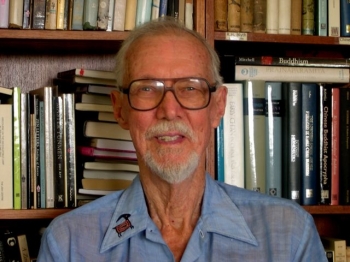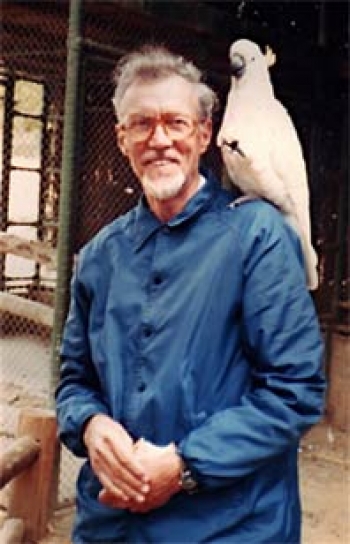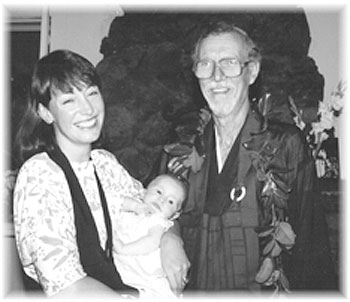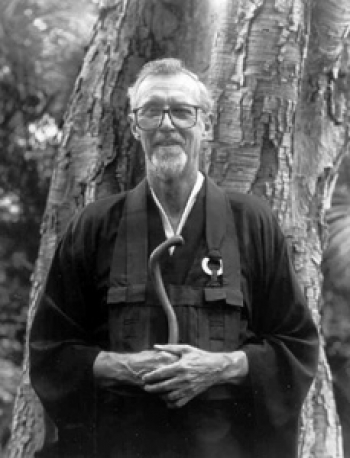“Facing my imminent death, I vow with all beings to go with the natural process at peace with whatever comes. When someone close to me dies, I vow with all beings to settle in ultimate closeness and continue our dialogue there.”
A towering figure in Western Zen and the transmission of the Zen tradition to America, Robert Baker Aitken Roshi passed away on the 5th of August aged 93. Aitken Roshi lost a brief battle against pneumonia in Honololu, O’ahu, Hawai’i.
Born in Philadelphia in 1917, Aitken lived most of his youth (except for a year and a half in a California high school) in Hawai’i after his father accepted an appointment at the Bishop Museum in Honolulu. He spent two and a half years at the University of Hawai’i before the outbreak of World War II. On the day after Pearl Harbour was bombed, he was captured by Japanese soldiers and spent the rest of the war in civilian interment camps in Japan. As ironic luck would have it, this was when the future Roshi was first exposed to Zen after a prison guard loaned him a copy of Zen in English Literature and the Oriental Classics, by R.H. Blyth. Fascinated by Zen and experiencing a further twist of fate, Aitken and the book’s author, Blyth, were transferred to the same camp. Thus began his intellectual familiarization in the Zen tradition.
Upon the war’s end, Aitken returned to Hawai’i and completed his undergraduate degree in English literature. He moved to California and became a student under Nyogen Senzaki, who gave Aitken the Dharma name Chotan (Deep Pool). Equipped with the knowledge of koan study, Aitken once more returned to Hawai’i and earned a Master’s in Japanese studies in 1950. In the same year, he returned to Japan and studied under Rinzai master Soen Nakagawa Roshi.
Soen Roshi confirmed Aitken’s deeper understanding of Zen in 1971, after successfully engaging in koans and proving himself to his masters as a teacher in his own capacity. In 1959, he and his wife Anne established the Kokoan Zendo (although his training in Zen would continue well into the 1970’s). This would become the Diamond Sangha network, with centres on several Hawai’ian islands and in California, Arizona, Texas, Washington State, Germany, Argentina, and New Zealand. Thanks to his collaboration with his senior student and first Dharma heir, John Tarrant, the Diamond Sangha is currently the largest Zen organization in Australia.
Aitken Roshi is now known as one of Western Zen’s foremost social justice activists. He was a founder of the Buddhist Peace Fellowship (with another of his senior students Nelson Foster, Mrs. Aitken, Zen Master Thich Nhat Hanh, poet Gary Snyder, deep ecologist Joanna Macy, Insight Meditation teacher Jack Kornfield, Pure Land exponent and priest Al Bloom, and more). Among the many books written by Aitken Roshi, Taking the Path of Zen is seminal to scholars and practitioners (or both) of Zen, and his Mind of Clover is still considered a classic on Buddhist ethics.
Like the late Most Venerable Sheng Yi, Aitken Roshi was a witness to the inhumanity of humanity, but also responsible for the flourishing of Zen as a tradition that was open to the Western consciousness, which was experiencing great inner contradictions after the fragmentation of the colonial empires and the war against Nazi Germany and imperial Japan. Perhaps it is the spirit of Zen – one that transcends attachment to human concepts without losing compassion for the human spirit – is what the West was longing for after having bred and suffered greater brutality than “all the violence imagined to the despots of Asia” (Thomas Merton). His efforts to bring about a blooming of Zen in the West were, on the whole, extremely successful, and Zen is has established itself in the United States, Europe, and Australia as a progressive path of awakening unattached to rituals or cultural conventions.
This largely positive image of Zen is thanks to the bodhisattva work of teachers like Robert Aitken Roshi, who spoke in the spiritual language of a post-modern, scientific, rational world. In his memory and following his example, we can also take advantage of these fruitful conditions and work toward the continued flourishing of the Buddhist way of life for future generations.
This largely positive image of Zen is thanks to the bodhisattva work of teachers like Robert Aitken Roshi, who spoke in the spiritual language of a post-modern, scientific, rational world. In his memory and following his example, we can also take advantage of these fruitful conditions and work toward the continued flourishing of the Buddhist way of life for future generations.


















